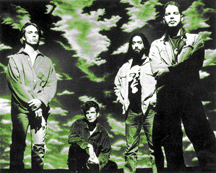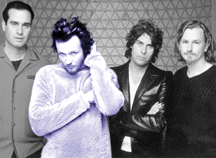

[ Music Index | Metro | Metroactive Central | Archives ]
Is Grunge Gone for Good?
Down the Upside Staircase: Soundgarden sticks to its hard-rock roots.
New releases by Soundgarden and Stone Temple Pilots spell the death of grunge as we know it
By Gina Arnold
MANY YEARS AGO, around 1986, I got a call from a publicist who was wildly enthusiastic about a new band on the SST label. He was sure I'd love it, he said, because it sounded like "a cross between Black Sabbath and the Butthole Surfers."
"That sounds horrible," I yelped, slamming down the phone with fear and loathing, but said publicist went on to have the last laugh. The band in question was Soundgarden, and not only did it achieve fame and fortune, but as a corollary, the sound described that day subsequently swept the airwaves in the form of a mania called grunge.
This spring, 10 years after that unpropitious phone call, Soundgarden has another new album out, Down on the Upside on A&M (its fifth), and the Butthole Surfers have a hit at last (although the song, "Pepper," sounds more like Nine Inch Nails than Nirvana). The sound called grunge, however, is definitely on the wane. What killed it? Time and drugs, always a fatal combination.
Time, of course, tends to date even the most forward-looking of cultural statements, and grunge--a reaction to years of repressive Republican rule and the concomitantly enforced cheery conventionality of radio and TV--has, happily, outlived its usefulness. But in some ways, the Battle of Seattle was lost before it began, when grunge pinned half its appeal onto the so-called glamour of heroin addiction.
You'd think, by now, that heroin would have lost its cachet, but no. Last week, Scott Weiland, lead singer for one of grunge's top acts, the Stone Temple Pilots, was arrested for possession of heroin and remitted for treatment, thus scotching plans for a summer tour in support of the band's new album, Tiny Music ... (Atlantic).
The Stone Temple Pilots aren't the only big grunge band to be adversely affected by drugs. Alice in Chains singer Layne Staley has also been prevented from touring due to heroin problems, as have members of Mudhoney, Seven Year Bitch, Unsane, Hole, Porno for Pyros and the Breeders. And, of course, there's Kurt Cobain, grunge's brightest star, who killed himself after escaping from a drug-treatment center in 1994.
In short, the question of which grunge bands have been affected by heroin isn't really half as relevant as which bands haven't. It's no coincidence that the members of grunge music's two most beloved and consistent acts, Pearl Jam and Soundgarden, are all drug-free. Anyone who thinks that doing heroin will add to their image, talent or chances of making it in the music industry would do well to keep this fact firmly at the forefront of their brains.
ALTHOUGH WEILAND'S trouble with drugs is symptomatic of the trouble with grunge, the genre as a whole is also suffering from a lack of inspiration within its flagship bands. Both the Stone Temple Pilots and Soundgarden have new albums out this spring, and neither is calculated to resuscitate the failing health of grunge as a movement.
Case in point: This summer, Soundgarden will be the first band to appear on the bill of two Lollapaloozas. In 1992, Soundgarden was fourth on the bill of Lollapalooza #2, sandwiched between Jesus and Mary Chain and Ice Cube. This time out--Lolla #6--Soundgarden will move up on notch, playing fifth, between the Ramones and Rancid.
In short, commercially speaking, Soundgarden is holding steady. That's better then what Jesus and Cube are doing, but the band's new record, Down on the Upside, is dour, changeless and, frankly, boring. True, "dour" is the operative word for all of Soundgarden's albums, but enough is enough.
Soundgarden's great strength has always been that its lyrics aren't dumb, a miracle for music that could easily, in another era, be mistaken for heavy metal. At times, they're even profound. "Fell on Black Days" (1994) still stands as the best comment on Seattle's heroin haze ever. Soundgarden is also the world-champion heavy-metal singles band; no other hard-rock group, including Metallica, has been able to turn the turgid genre of metal into such arresting singles.
"Pretty Noose," the first single from Down on the Upside, continues in this tradition; "Rhinosaur," the next song on the album, is equally dynamic. But the rest of Down on the Upside falls short of that standard. It's a long album--over an hour--and, for the most part, it plods along remorselessly.
"Applebite" is an instrumental, written by drummer Matt Cameron. "Boot Camp" is a ballad, reminiscent of "Black Hole Sun" but not nearly as distorted and good. There are a few short thrashers that dip into the occasional moment of solo-ridden speed-metal excitement, but as a whole, the record never really coalesces into a grandiose Statement of Purpose.
WITHOUT BEING exactly bad, Soundgarden shows little spiritual, emotional or musical growth. There is something about the band, however--its dignity, or perhaps its musicality--that makes the group difficult to criticize.
Rudderless: The Stone Temple Pilots continue to crash and burn.
Not so the Stone Temple Pilots, who were grunge's main whipping boys for years until bands like Bush, Silverchair and Candlebox overtook them in the Nirvanabe sweepstakes.
In bygone days, the Stone Temple Pilots--sometimes called Stone Temple Toilets or Eddie and the Cruisers because of Weiland's remarkable vocal resemblance to Eddie Vedder--were known for their brilliant Pearl Jam imitation.
But on Tiny Music, the band sounds less like Pearl Jam and more like Collective Soul. At least on their first record, Core, the Pilots, like Pearl Jam before them, synthesized respectable sources like Fugazi, Soundgarden and R.E.M.; now, they don't even have the virtue of good taste to fall back on.
Tiny Music ... proves once and for all that the Stone Temple Pilots lack all sense of originality. There's even a song here called "Ride the Cliché." But the album lacks energy in an even more profound way: as usual, every word is some kind of twisted take on something else, usually a band or song name. "Pop's Love Suicide" reminds one of Low Pop Suicide, a band led by Chris Connolly of Ministry; other songs invoke Humble Pie, David Bowie, "Sweet Home Alabama," "Lady Madonna," you name it.
Once again, the band has synthesized all it hears on radio, but this time, what they're currently listening to--faceless alternarock wonders like 1,000 Mona Lisas, Deep Blue Something and Tripping Daisy--has been synthesized into shit.
In fact, the music of Stone Temple Pilots is the soylent green of grunge right now, an ultraprocessed and uninspired melee of sounds, produced into relative coherence by producer Brendan O'Brien, best known for producing Pearl Jam.
This sorry fact is utterly apparent on awful songs like "Lady Picture Show" and "Adhesive," which are messy and confused. The single, "Big Bang Baby," is a bit catchier but just as puzzling; its lodestar seems to be equally muddy bands like Blur, Suede and Pulp. The only tolerable song on the record is "Tripping on a Hole in a Paper Heat," which comes across as more coherent simply because it sounds more like the songs on the last album, Purple.
But who'd ever have thought one would want the Stone Temple Pilots to sound more like their former selves? You have to pity the Pilots, because they're in such bind. Whereas Soundgarden remains true to its '80s hard-rock roots, the Stone Temple Pilots, by attempting to move with the times and change a little, have shown an even deeper level of insincerity.
And then, of course, there's Scott's Terrible Problem to contend with. In a 1995 article in Spin magazine about Mia Zapata, a Seattle musician who was brutally murdered by an apparent drifter on her way home from band practice one night, a local musician remarked, "This kind of incident is the reason we do heroin."
But that's a cop-out. People do heroin because their friends do heroin--just as people play grunge because their friends listen to grunge, and so on. Heroin probably won't go away just because grunge does, but it may well remove itself from the pop-music zeitgeist for a while, and that would be a good thing.
[ Metro | Metroactive Central | Archives ] This page was designed and created by the Boulevards team.

Kevin Westenberg

John Eder
From the May 16-22, 1996 issue of Metro
Copyright © 1996 Metro Publishing and Virtual Valley, Inc.